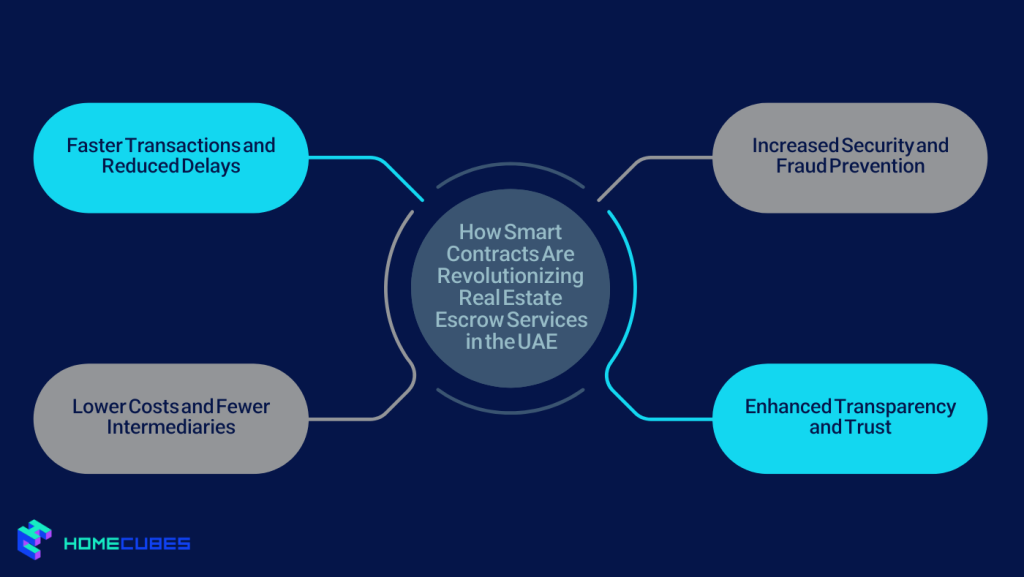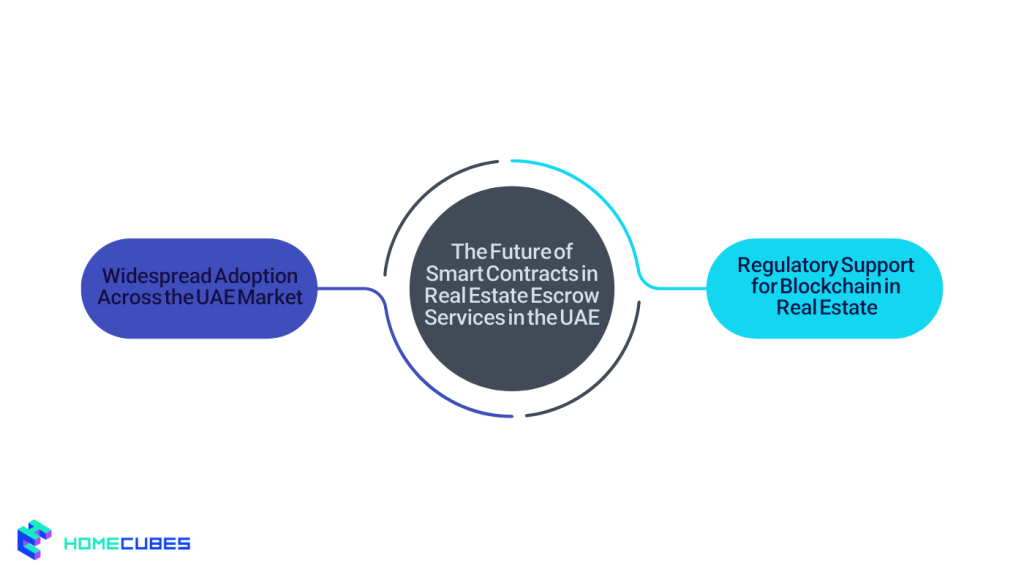

The UAE’s real estate market is one of the most dynamic and lucrative in the world, attracting both local and international investors. Traditionally, real estate transactions in the UAE have relied on escrow services to ensure that funds are securely held and released only when both parties fulfil their contractual obligations. While this system has worked for decades, it often involves delays, intermediaries, and administrative overhead. Enter smart contracts—an innovative solution powered by blockchain technology that is revolutionizing real estate escrow services in the UAE, making transactions faster, more secure, and more efficient. This article explores how smart contracts are transforming the real estate escrow process in the UAE.
Understanding Smart Contracts and Their Role in Real Estate Escrow
What Are Smart Contracts?
1/ SmartCode 101 📚
What Are Smart Contracts? 🤖
Smart contracts are self-executing programs that run on blockchain networks. They automatically enforce agreements without intermediaries.
Operating under predefined rules, they bring transparency and security to every… pic.twitter.com/LIBVIJ0OuB
— Vestra (@Vestra_DAO) January 12, 2025
Smart contracts are self-executing digital contracts that automatically enforce the terms and conditions of an agreement. Powered by blockchain technology, smart contracts operate in a decentralized environment without the need for intermediaries such as banks or lawyers. In real estate transactions, smart contracts can automate the process of transferring ownership, releasing payments, and fulfilling any other conditions, all while ensuring transparency and security.
How Smart Contracts Are Revolutionizing Real Estate Escrow Services in the UAE

1. Faster Transactions and Reduced Delays
Traditional real estate escrow services in the UAE often involve several steps, including verification of documents, fund transfers, and approval from multiple parties. These steps can lead to delays and often extend the time it takes to close a deal. Smart contracts streamline this process by automatically executing the terms of the agreement after meeting the conditions, removing the need for manual oversight and approval.
For example, once a buyer transfers the payment to a smart contract, the funds automatically transfer in escrow. The contract will then verify that the seller has met the conditions, such as providing the required property documents. Once both parties fulfil their obligations, the smart contract releases the funds to the seller and transfers ownership of the property to the buyer. This significantly reduces the time spent on administrative tasks and speeds up the closing process.
2. Increased Security and Fraud Prevention
One of the biggest concerns in real estate transactions is the risk of fraud. With traditional escrow services, there is always a potential risk of mismanagement, forgery, or dishonesty from the parties involved. Smart contracts eliminate this risk by ensuring that all terms are transparent, secure, and automatically executed.
Since smart contracts are powered by blockchain, they are tamper-proof and cannot be altered once created. This means that once the contract is in place, it is virtually impossible for any party to alter the agreement or misappropriate funds. Furthermore, blockchain’s transparency allows all involved parties—buyer, seller, and escrow service provider—to track the status of the transaction in real-time.
3. Lower Costs and Fewer Intermediaries
Traditional escrow services often involve several intermediaries, such as banks, lawyers, and notaries, all of whom charge fees for their services. These intermediaries can add significant costs to a real estate transaction, especially for large deals. Smart contracts reduce the need for these intermediaries by automating the entire escrow process, cutting down on fees and saving both the buyer and seller money.
By removing the need for third-party services, smart contracts also simplify the transaction process. There’s no need to rely on multiple parties to confirm the transfer of funds or the completion of documents. The smart contract automatically handles these tasks, ensuring that both parties meet their obligations without any delays or additional costs.
4. Enhanced Transparency and Trust
In traditional escrow services, parties involved in the transaction may have concerns about the transparency of the process, especially when it comes to the handling of funds and the release of payments. With smart contracts, blockchain records the entire process, providing a transparent and immutable record of all actions taken.
Blockchain’s decentralized nature ensures that no single party controls the process, fostering trust between buyers and sellers. Both parties can track the status of the transaction in real-time. They would ensure that the terms of the contract will be automatically executed once the conditions are met. This transparency builds confidence in the transaction, ensuring that the escrow process protects all parties.
The Future of Smart Contracts in Real Estate Escrow Services in the UAE

1. Widespread Adoption Across the UAE Market
UAE continues to lead the way in blockchain adoption. Hence, smart contracts will become a standard feature in real estate escrow services. Real estate developers, brokers, and escrow companies are increasingly recognizing the value of blockchain technology in improving the efficiency and security of transactions. It is expected that more escrow service providers in the UAE will likely integrate blockchain and smart contracts into their offerings. Besides, smart contracts could soon become the norm in real estate transactions, replacing traditional escrow systems.
2. Regulatory Support for Blockchain in Real Estate
The UAE government has been proactive in supporting blockchain technology, and as smart contracts gain traction, it is likely that regulations will evolve to support their use in real estate escrow services. Clear legal frameworks for smart contracts will ensure that all parties involved in a transaction have the legal certainty needed to confidently use blockchain-based systems. Hence, the UAE government is likely to introduce clear guidelines and regulations that recognize the legality of smart contracts in real estate transactions.
As blockchain technology continues to grow in real estate, regulations will provide clarity on issues such as UAE taxation system in real estate sector, compliance, and dispute resolution.
Challenges of Smart Contract Adoption in Real Estate Escrow Services
1. Legal and Regulatory Uncertainty
While smart contracts offer significant benefits, legal frameworks for their use in real estate transactions are still in the process of development. The UAE will need to establish clear guidelines for the use of smart contracts in escrow services. This is essential to ensure that they are legally recognized and enforceable.
Legal recognition of smart contracts needs to be formalized, ensuring they are valid and enforceable in real estate deals. Besides,there may be uncertainties around the taxation of blockchain transactions and how compliance with local laws will be handled. Furthermore the legal framework for smart contracts in real estate escrow services must be in full compliance with UAE legal guidelines for foreign investment in the real estate sector.
2. Technological Integration
For smart contracts to be widely adopted, real estate professionals in the UAE must integrate blockchain platforms into their existing processes. This could require significant investment in technology and training, which may be a barrier for some companies.
Real estate firms will need to invest in blockchain infrastructure to support smart contract adoption. Furthermore, real estate professionals must be educated on how to use blockchain and smart contracts to maximize their benefits.
Conclusion:
Smart contracts are revolutionizing real estate escrow services in the UAE by providing faster, more secure, and cost-effective solutions. Smart contracts have the ability to automate the entire escrow process, reduce fraud, lower transaction costs, and increase transparency. Hence, they offer a more efficient alternative to traditional escrow services. As the UAE continues to embrace blockchain technology, the future of real estate transactions will likely be defined by the widespread adoption of smart contracts, making the process smoother and more reliable for buyers and sellers alike.
Homecubes, a licensed real estate tokenization platform focusing on Dubai real estate, has several exciting property tokenization projects in the pipeline. We encourage you to contact us for more information on our lucrative fractional investment opportunities in premium properties across Dubai.










